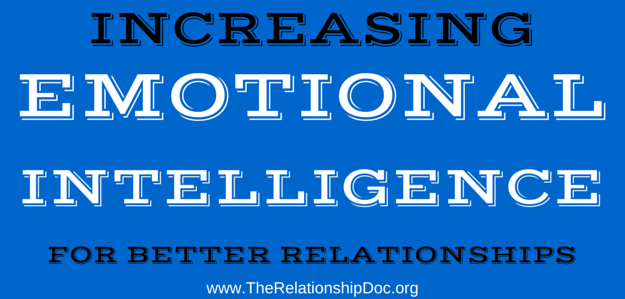 There are a wide variety of factors that are important in order to have a harmonious and happy relationship. Educational, religious, familial, and goal compatibilities are certainly important, among numerous others. However, recent research suggests that a high level of emotional intelligence (EI) is also a valuable component to deep personal connections and happier relationships. This finding is true for both men and women.
There are a wide variety of factors that are important in order to have a harmonious and happy relationship. Educational, religious, familial, and goal compatibilities are certainly important, among numerous others. However, recent research suggests that a high level of emotional intelligence (EI) is also a valuable component to deep personal connections and happier relationships. This finding is true for both men and women.
To mental health professionals, the emotional intelligence factor is hardly a surprise, but it may not be common knowledge to others. What is EI anyway, and just how does it affect our relationships?
A good definition of emotional intelligence is the ability to be aware of one’s own emotional state, the emotions of others, and respond appropriately to maximize our personal and professional lives. More specifically:
1. Being aware of your own emotions, and willing to experience and deal with them instead of pushing them away, is a good sign of high emotional intelligence. Knowing your strengths and weaknesses, as well as how your emotions affect your behavior and thoughts, is an important part of this component.
2. The ability to manage your more challenging emotions by self-soothing (having the ability to calm yourself) and transitioning into a better place is another indication of healthy EI. Managing our emotions in healthy ways helps us to adapt, take the initiative, and follow through with commitments.
3. The ability to tune in to the emotional state of others by listening, expressing, and understanding their emotions (having empathy) is an important asset in strengthening all of our relationships. Having high EI levels helps us communicate well, and work well with others.
The good news is that, unlike typical IQ measured ability, your level of emotional intelligence can be improved!
Here are some ways to increase your EI:
1. Take your internal “temperature”: Choose three intervals during the day (perhaps at meals) and take inventory of your emotions. What/how are you feeling at this particular moment in time? Note if you’re angry, joyful, anxious, frustrated, stressed, etc. Rate the intensity level on a scale from 1 to 10. Daily practice of the exercise will absolutely improve and heighten your emotional awareness (and your EI).
2. Once you’ve become more aware of your emotions, see if you can notice patterns. For example: when you’re stressed out, do you snap more at your partner? If you’re feeling sad or anxious, do you overeat?
3. Becoming more connected to your emotions will, in turn, help you become more mindful and connected to your body. Discovering how to relax and nurture yourself improves your ability to regulate your emotions and it increases emotional intelligence.
4. Work on learning to empathize with others by putting yourself in someone else’s shoes. Practice this multiple times throughout the day. Repetition with any exercise helps imprint the process in our memory bank. Imagine what your waitress might be feeling, or your boss, your child, etc. Is there some way you can improve their emotional state and your relationship with this individual?
5. Notice other people’s body language; read the nonverbal cues. What do they mean? Paying attention can help facilitate understanding and connectivity.
In addition to the five steps above, going to couples or individual therapy to work on EI development is also highly recommended. The better we know ourselves, the more prepared we are to improve our relationships. When both partners work on increasing their EI, they are likely to noticeably improve their relationship even faster. Whether the goal is climbing the corporate ladder, bonding with our children, or having a better than ever sex life with our partner, increasing our emotional intelligence can be one important key to its success.